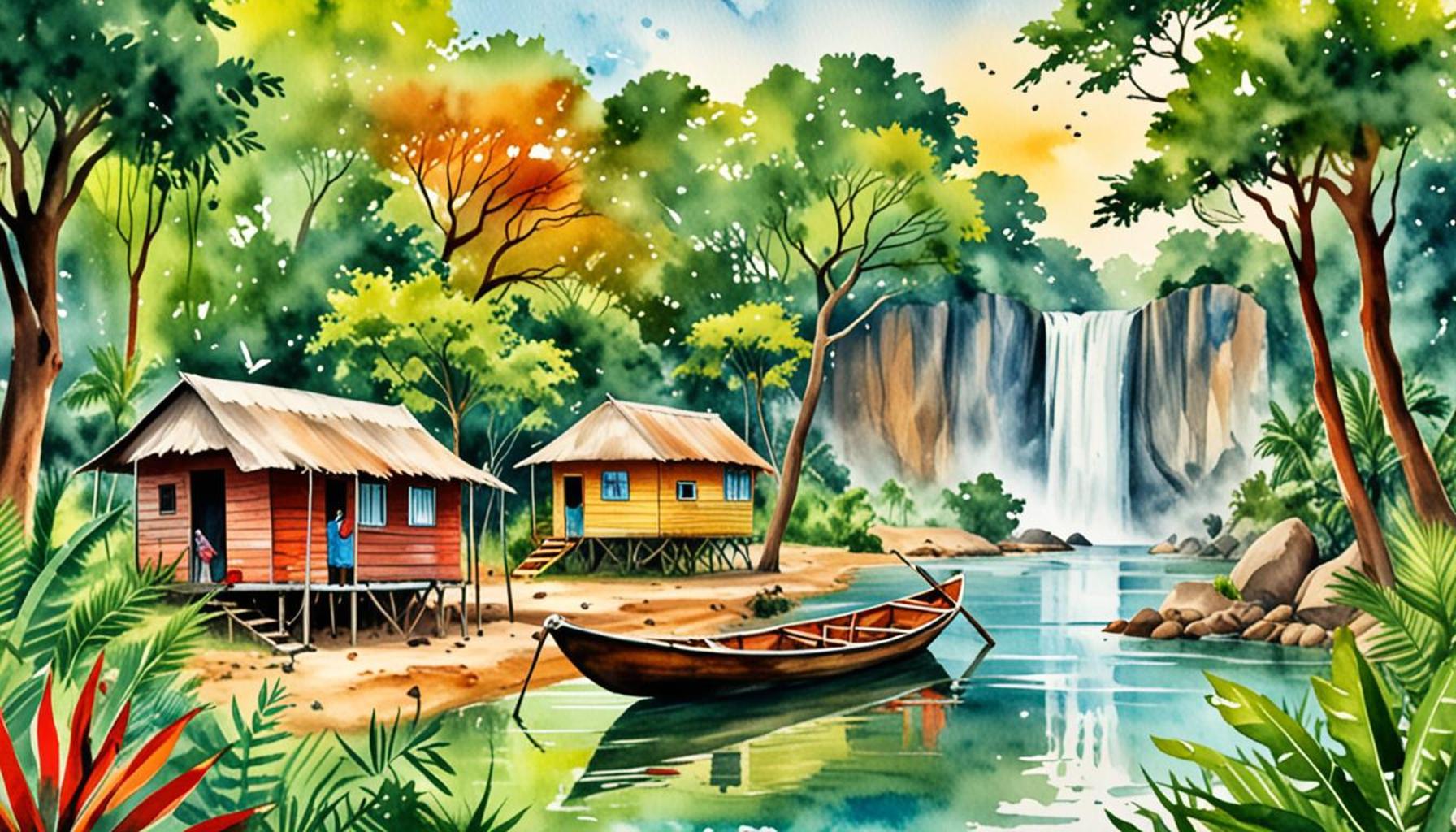Wildlife Trails: Discovering Nigeria’s Biodiversity

Discovering Nigeria’s Natural Treasures
Nigeria is a vibrant tapestry of ecosystems, offering an unparalleled opportunity to experience an array of wildlife that is both diverse and rich. Spanning from the coastal areas of the Gulf of Guinea to the northern fringes where the Sahel begins, the country’s natural landscapes allow for unique wildlife trails that beckon adventurers and nature enthusiasts alike. These trails not only reveal Nigeria’s natural beauty but also underscore the urgent need for dedicated conservation efforts to preserve these extraordinary habitats.
What to Expect on Your Journey
- Encounter numerous animal species: Wildlife enthusiasts have the chance to explore habitats that are home to majestic African elephants, elusive lions, and rare primates like the crippling Red-capped Mangabey. Visits to locations such as the Nigerian National Park provide an opportunity to witness these magnificent creatures in their natural environments.
- Experience diverse ecosystems: The beauty of Nigeria’s wildlife trails lies in the varied ecosystems they traverse, from the mangroves along the coast that teem with life, to the wetlands of the Niger Delta, and the rocky mountain ranges of the Jos Plateau. Each ecosystem presents distinct flora and fauna that contribute to Nigeria’s ecological diversity.
- Learn about conservation challenges: Engaging with local conservation initiatives allows visitors to greatly understand the critical issues facing wildlife, including poaching and habitat destruction. Organizations like the Wildlife Conservation Society are actively working to mitigate these challenges through community engagement and awareness programs.
Bird watchers will find Nigeria particularly enchanting, as over 600 species of birds can be observed, including the stunning African grey parrot, renowned for its intelligence and vibrant plumage, and the awe-inspiring ostrich, the world’s largest bird. Navigating these wildlife trails is not just an opportunity for personal discovery; it invites travelers to become part of a critical narrative about biodiversity conservation and the stewardship of the environment.
The Importance of Biodiversity
Preserving biodiversity in Nigeria is vital for maintaining ecological balance and ensuring the health of our planet. The country’s wildlife holds significant importance for several reasons:
- Ecological balance: The interdependence of species creates intricate webs that maintain healthy ecosystems. The loss of a single species can cascade into a broader environmental impact, illustrating the importance of every creature within its ecosystem.
- Cultural significance: Wildlife significantly influences local traditions, folklore, and heritage. Many Nigerian cultures incorporate wildlife symbolism in their art, language, and rituals, creating a deep-rooted appreciation for the biodiversity that surrounds them.
- Economic opportunities: Ecotourism serves as a means to support local communities while fostering a culture of conservation. With the proper investment and promotion, Nigeria stands to gain immensely from attracting eco-conscious travelers who contribute to the local economy while advocating for the preservation of the nation’s natural wonders.
As we explore the unique wildlife trails of Nigeria, we invite you to delve deeper into the essence of the nation’s rich natural heritage, and discover the magnificent creatures that inhabit its forests, savannas, and mountains, while highlighting the importance of sustainable practices that will ensure their survival for generations to come.
ADDITIONAL INSIGHTS: Expand your understanding here
Exploring Nigeria’s Riched Wildlife Trails
Nigeria’s wildlife trails offer an amazing journey through some of the most stunning landscapes in Africa. Each trail presents distinct opportunities to observe not only the country’s rich fauna but also its breathtaking flora, patient rivers, and vibrant ecosystems. As travelers embark on these trails, they are ushered into a world where colors, sounds, and scents intertwine in a harmonious celebration of nature.
Key Wildlife Trails to Discover
When exploring Nigeria’s wildlife, several notable trails provide immersive experiences into the heart of biodiversity. The following trails are just a glimpse into what the country has to offer:
- Yankari National Park: This expansive park is perhaps one of the most famous wildlife destinations in Nigeria. It is home to a variety of species, including the West African manatee and the roan antelope, making it a must-visit. The park’s hot springs are also a unique feature that adds to the appeal for visitors seeking relaxation amidst nature.
- Gashaka Gumti National Park: Nigeria’s largest national park, Gashaka Gumti, offers breathtaking scenery along with abundant wildlife including buffalo, chimpanzees, and the elusive African golden cat. Hiking the trails here not only showcases stunning views but also gives adventurers a chance to connect with local communities participating in conservation efforts.
- Cross River National Park: A UNESCO World Heritage site, this park is crucial for the conservation of the endangered Cross River gorilla. Its lush forests and varied landscapes make it idyllic for birdwatchers and trekking enthusiasts, further highlighting Nigeria’s ecological significance.
- Okomu National Park: Located in Edo State, Okomu is a hidden gem filled with wildlife such as forest elephants and black-and-white colobus monkeys. This park is vital to the preservation of Nigeria’s rainforest ecosystem, making it an essential stop for eco-tourists concerned with conservation.
Each of these trails offers distinct opportunities for exploration and connection with nature. From the dense jungles to sprawling savannas, visitors will be captivated by the array of sights and sounds that define Nigeria’s wildlife. Alongside these adventures, travelers will gain insights into the daily efforts of local communities and organizations dedicated to wildlife conservation, thus enhancing their experience and understanding of the complexities surrounding biodiversity.
Connecting with Nature and Community
As travelers navigate these trails, they are not just observers; they become a vital part of the larger conservation story. Engagement with local communities enriches the experience, providing visitors with a deeper understanding of the cultural ties to wildlife and the ongoing efforts to protect these natural environments. Whether it’s through guided tours, cultural exchanges, or volunteer opportunities, every step taken on Nigeria’s wildlife trails helps foster a greater appreciation for the intricate balance of nature.
In embarking on this journey through Nigeria’s wildlife trails, you contribute to a growing movement toward sustainability and conservation. The beauty of Nigeria’s biodiversity awaits those ready to embrace it and advocate for its preservation for generations to come.
| Advantage | Description |
|---|---|
| Rich Biodiversity | Nigeria is home to diverse ecosystems, showcasing unique species native to the region. |
| Ecotourism Opportunities | Visitors can engage in sustainable tourism, promoting conservation while experiencing nature firsthand. |
| Community Engagement | Local communities benefit through involvement in conservation efforts, enhancing livelihoods through eco-friendly initiatives. |
| Research and Education | Establishing trails fosters research opportunities for scientists and educational programs for all ages to learn about Nigeria’s wildlife. |
LEARN MORE: This related article may interest you
The Importance of Conservation Efforts
Exploring Nigeria’s wildlife trails is not just an exhilarating adventure; it also plays a crucial role in the ongoing efforts to conserve the incredible biodiversity that flourishes within its borders. With Nigeria possessing over 1,500 species of birds, numerous mammal species, and a plethora of reptiles and amphibians, the urgent need to protect these habitats has become increasingly apparent.
Community-Driven Conservation Initiatives
Many of the wildlife trails are deeply intertwined with local communities that rely on biodiversity for their livelihoods. In places like Yankari National Park and the Cross River National Park, community members are involved in conservation efforts aimed at protecting their environment while promoting ecotourism. This sustainable approach not only empowers local people but also fosters an appreciation for Nigeria’s rich wildlife among visitors. Efforts by organizations such as the Nigerian Conservation Foundation and the Wildlife Conservation Society work hand-in-hand with community leaders to enhance wildlife protection and promote environmental education, which is critical in maintaining the delicate balance between conservation and local needs.
The Role of Technology and Research
As scientific research plays an essential role in the preservation of Nigeria’s biodiversity, technology has become an invaluable asset in monitoring wildlife populations. Satellite tracking and drone surveillance allow scientists to observe animal movements and behaviors without causing disruption to their natural habitats. For example, the tracking of the endangered Cross River gorilla provides crucial data for conservationists working to protect remaining populations. By leveraging technology, researchers can identify patterns that inform decision-making and conservation strategies vital for the survival of endangered species.
Seasonal Highlights and Unique Experiences
Each wildlife trail offers a unique experience depending on the season, providing diverse opportunities for wildlife enthusiasts. For instance, the dawn and dusk hours are often the best times to witness the vibrant activities of both mammals and birds. The rainy season, particularly from April to October, rejuvenates flora and fauna, making trails like those in the Gashaka Gumti National Park come alive with color and sound. This seasonal diversity attracts various species, including migratory birds, making it a prime time for birdwatching.
- Great Migration: While not as famous as the majestic migrations of the Serengeti, Nigeria’s various landscapes host unique animal movements, particularly among antelope and other herbivores, offering observers a chance to witness these patterns firsthand.
- Photography Opportunities: Photographers will find Nigeria’s trails rich with opportunities to capture stunning images of wildlife and landscapes, from the striking silhouette of an elephant against the sunset to the intricate details of vibrant bird plumage.
Engaging in these seasonal highlights enhances not just the visitor experience but also raises awareness of the importance of preserving these ecosystems. Each wildlife trail then becomes more than just a pathway through nature; it transforms into an educational journey about the vital role each species plays in the ecological web of Nigeria.
CHECK OUT: Click here to explore more
Conclusion: A Journey Worth Taking
Nigeria’s wildlife trails beckon adventurers and conservationists alike to immerse themselves in the nation’s vibrant biodiversity. These pathways are more than mere routes; they are gateways to understanding the intricate ecological networks that sustain various life forms in Nigeria. With over 1,500 species of birds and unique mammalian inhabitants, the significance of these natural corridors cannot be overstated. Each visit supports local economies, enriches personal experiences, and fosters a deeper commitment to conservation.
The collaborative spirit among local communities, conservation organizations, and scientific researchers is vital for the ongoing protection of these remarkable ecosystems. As communities embrace sustainable tourism, they not only enhance their livelihoods but also instill a sense of stewardship for their natural surroundings. The marriage between technology and conservation offers new, effective monitoring strategies, ensuring that species like the Cross River gorilla have a fighting chance against extinction.
Furthermore, exploring these trails during different seasons unveils an ever-changing tableau of wildlife activity, making every visit a unique adventure. From the thrilling migrations to the stunning photographic prospects, there is something for everyone in Nigeria’s diverse landscapes. Engaging with nature in this way inspires awareness and appreciation, reminding us that the preservation of biodiversity is a shared responsibility.
In conclusion, venturing into Nigeria’s wildlife trails is not just an exploration—it’s an essential journey that connects us to our natural heritage and underscores the need for collective conservation efforts. As you lace up your hiking boots for your next adventure, remember that every step you take contributes to safeguarding the future of Nigeria’s extraordinary wildlife.


